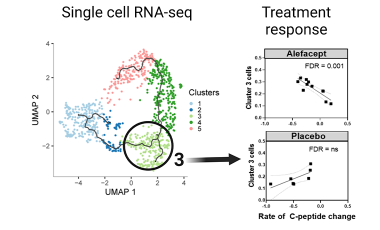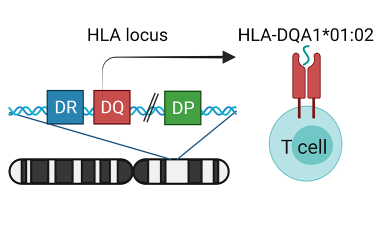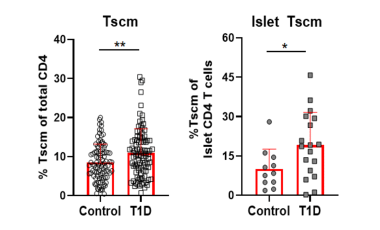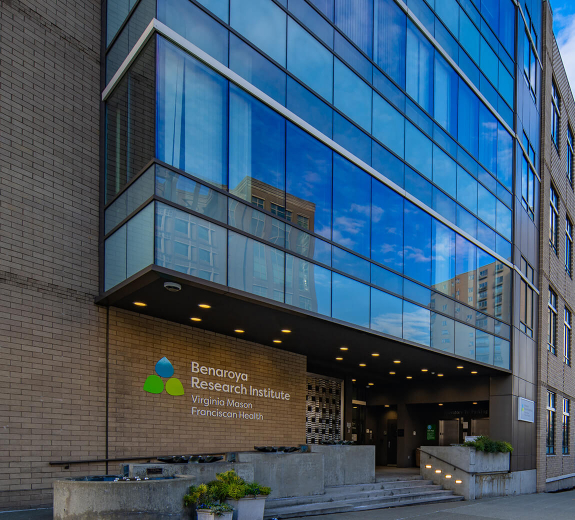Virginia Mason and its affiliate Benaroya Research Institute (BRI) are among the newest members of the Food Allergy Research & Education (FARE) network, a leading nonprofit organization working on behalf of the 15 million Americans with food allergies.
FARE announced its expansion today to now include Virginia Mason and Benaroya Research Institute; Columbia University Medical Center and NewYork-Presbyterian/Morgan Stanley Children’s Hospital in New York; Gores Family Allergy Center at Children’s Hospital Los Angeles; ‘Specially for Children, an affiliate of Dell Children’s Medical Center of Central Texas, an Ascension hospital in Austin; and University of Utah Health Care/Primary Children’s Hospital in Salt Lake City.
“We’re honored to have been selected to participate in the important work the FARE network is leading to improve safety and quality of life for individuals coping with food allergies,” said David Jeong, MD, a food allergy researcher and section head for allergy and immunology at Virginia Mason. “We are eager to collaborate with other centers of excellence across the nation to address this health issue through clinical research and discovery.”
“We’re delighted to join the FARE network to accelerate the development of life-saving diagnosis and treatment for people suffering with food allergies,” says BRI President Jane Buckner, MD. “In partnership with Virginia Mason clinicians, we’re increasing scientific knowledge about how allergies occur and pioneering the development of biomarkers for diagnosis, patient monitoring and prognosis in allergies. We’re honored to be counted among leaders in food allergy research, translating research in the laboratory to the clinic and back again.”
Launched in 2015, the FARE Clinical Network strives to accelerate the development of drugs for patients with food allergies as well as improve the quality of care for this serious illness. The network is made up of 28 leading research and care sites nationwide and represents an investment by FARE of approximately $2.7 million annually. In approximately one year, FARE Clinical Network centers served more than 56,000 patients with food allergies, with more than one-third of those patients new to the centers, reinforcing the urgent need for initiatives such as the network. FARE Clinical Network, an initiative that aims to accelerate the development of drugs for patients with food allergies as well as improve the quality of care for this serious illness.
Food allergy, the abnormal response to a food triggered by the body’s immune system, affects an estimated 6 to 8 percent of children under age 3 and up to 3 percent of adults, according to The Mayo Clinic.
“Accelerating the pace of research on food allergies and helping to ensure that we can expand access to clinical trials and high-quality medical care is one of FARE’s top priorities,” said James R. Baker, Jr., MD, CEO and chief medical officer of FARE. “The addition of five exemplary institutions to the FARE Clinical Network enables FARE to significantly broaden the reach of this initiative.”
FARE Clinical Network centers serve as sites for clinical trials for development of therapeutics and best practices for the care of patients with food allergies. The FARE Clinical Network is a powerful driver of collaboration to advance the field of food allergy, with member centers contributing to the development of a national food allergy patient registry. FARE plans to further expand the network to 40 to 50 sites within the next three years.
Members of the FARE Clinical Network are selected through a comprehensive, rigorous application process. The centers of excellence selected as part of the FARE Clinical Network provide high-quality clinical and sub-specialty food allergy expertise and services, and are focused on applying new evidence-based knowledge to this important field. These centers also meet high standards for clinical care, teaching and clinical research. View the full list of FARE centers of excellence.
“The FARE Clinical Network is a brilliant way to jump-start regional food allergy centers,” said Stephen Tilles, MD, a member of the FARE Clinical Advisory Board Executive Committee. “In our case at the Northwest Asthma and Allergy Center in Seattle and at centers across the country, FARE has provided funding that is critically needed in order to maintain a high quality food allergy center, contributing toward the acceleration of food allergy research and the availability of new treatments for patients. FARE support offsets costs for research coordinators who help manage the process of complex clinical trials, facilitating access to these trials for the patient community.”
In adults, foods that most often trigger allergic reactions include fish, shellfish, peanuts, and tree nuts, such as walnuts. Problem foods for children can include eggs, milk, peanuts, tree nuts, soy, and wheat, according to the National Institutes of Health. The allergic reaction may be mild. In rare cases it causes a potentially life-threatening reaction called anaphylaxis. Symptoms of food allergy may include itching or swelling in the mouth; vomiting, diarrhea, or abdominal cramps and pain; hives or eczema; tightening of the throat and trouble breathing; and/or drop in blood pressure. FARE recommends individuals managing food allergies meet with their physicians to discuss their individual needs in order to inform their personal healthcare decisions.
About Virginia Mason Health System
Virginia Mason, founded in 1920, is a nonprofit regional health care system based in Seattle that serves the Pacific Northwest. In the Puget Sound region, the system includes 336-bed Virginia Mason Hospital; a primary and specialty care group practice of more than 500 physicians; regional medical centers in Seattle, Bainbridge Island, Bellevue, Federal Way, Kirkland, Issaquah and Lynnwood; Bailey-Boushay House, the first skilled-nursing and outpatient chronic care management program in the U.S. designed and built specifically to meet the needs of people with HIV/AIDS; Benaroya Research Institute, which is internationally recognized for autoimmune disease research; and Virginia Mason Institute, which trains health care professionals and others from around the world in the Virginia Mason Production System, an innovative management methodology for continually improving quality, safety and efficiency. Virginia Mason online: VirginiaMason.org
Virginia Mason also includes Yakima-based Memorial Family of Services and Yakima Valley Memorial Hospital, a 226-bed facility serving the Yakima Valley in Central Washington since 1950. Memorial Family of Services comprises primary care practices and specialty care services, including high quality cardiac care, a continuum of cancer care, hospice care, and advanced services for children with special health care needs. Memorial online: YakimaMemorial.org







